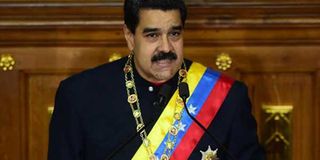Maduro orders Venezuela military drill after Trump threat

Venezuelan President Nicolas Maduro addresses the all-powerful pro-Maduro assembly in Caracas on August 10, 2017. He has ordered his armed forces to carry out a national exercise next week in response to US President Donald Trump's threat of possible military action. AFP PHOTO | RONALDO SCHEMIDT
What you need to know:
- Maduro's government has seized on Trump's warning last Friday that he was looking at a range of scenarios against Venezuela.
- Venezuelan Defence Minister General Vladimir Padrino called it "crazy".
- Venezuela, an ally to Cuba and Russia, reportedly bought Russian anti-aircraft defences and tanks years ago.
CARACAS
Venezuelan President Nicolas Maduro on Monday ordered his armed forces to carry out a national exercise next week in response to US President Donald Trump's threat of possible military action.
"I have given the order to the armed forces' joint chiefs of staff to start preparations for a national civil-military exercise for the integrated armed defence of the Venezuelan nation," he told thousands of supporters in a Caracas rally.
The drill will take place August 26 and 27, he said.
Maduro's government has seized on Trump's warning last Friday that he was looking at a range of scenarios against Venezuela, "including a possible military option if necessary."
CRAZY
Venezuelan Defence Minister General Vladimir Padrino called it "crazy," saying it showed America had "dropped its mask" in terms of wanting to attack his country.
The Maduro administration says Trump's words bolster its oft-repeated claim that Washington has designs to grab control of Venezuela's proven oil reserves, the largest in the world.
The threat, made in response to Venezuela's deepening economic crisis and Maduro's moves toward what the US labels a "dictatorship," has been rebuffed by all of Latin America — even countries opposed to Venezuela.
The Pentagon said it had received no orders from Trump to ready any sort of military action against Venezuela.
US Vice President Mike Pence, who is touring allies in Latin America to marshal joint action against Caracas, said Trump's warning stood — but he hoped a "peaceable solution" would be found.
YANKEE GO HOME!
The Caracas rally stretching in front of Maduro took up the president's exhortations against the United States with cries of "Yankee go home!"
The leftist leader vowed to "defend the country with tanks, planes, missiles."
Venezuela, an ally to Cuba and Russia, reportedly bought Russian anti-aircraft defences and tanks years ago, under Maduro's predecessor Hugo Chavez.
Pence, on his first stop of a tour taking in Colombia, Argentina, Chile and Panama, said the United States intended to prevent Venezuela becoming a "failed state."
"We will not stand by as Venezuela crumbles, but it's important to note, as the president said, that a failed state in Venezuela threatens the security and prosperity of the hemisphere," Pence told reporters in the Colombian city of Cartagena.
GREATER PROBLEM
He told CNN in an interview that Venezuela risked becoming "a greater problem for narcotics traffic" and "greater migration" — both of which he said directly threatened the security and economy of the US.
On Sunday, Pence stood by Trump's threat of possible military action, saying the US president "says what he means and means what he says."
But he expressed hope a "peaceable solution" could be found.
Colombian President Juan Manuel Santos, who has led criticism of Maduro, told Pence on arrival "that the possibility of a military intervention shouldn't even be considered."
US SANCTIONS
Many Latin American countries have bitter memories of past US adventures in the region.
Those include invasions, gunboat diplomacy and the propping up of military dictators.
Even the Venezuelan opposition coalition on Sunday rejected "the use of force, or the threat of applying such force, by whatever country against Venezuela."
China, too, said it stood against foreign powers interfering in other countries.
Maduro, in a later televised event with various ambassadors stationed in Caracas, said he wanted a regional "closed-door presidential summit" to talk about Venezuela and Trump's threat.
DIALOGUE
"The threat of war can only dissipate with dialogue," he said.
Washington has already imposed unilateral sanctions on Maduro and nearly two dozen of his officials for what it sees as a shift to "dictatorship."
The sanctions came in response to a new loyalist body, an all-powerful Constituent Assembly, which supersedes the legislature controlled by the opposition.
The body has joined with the loyal Supreme Court to quash dissent and arrest opposition politicians.
Venezuela's economy is heavily reliant on oil exports. Shipments to the United States — its biggest paying customer — account for 40 per cent of its crude production, but only eight percent of US oil imports.
The US sanctions so far have targeted individuals and not Venezuela's oil industry, which would have consequences for US refineries.





